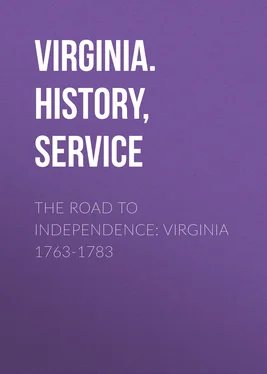Virginia. History, Government, and Geography - The Road to Independence - Virginia 1763-1783
Здесь есть возможность читать онлайн «Virginia. History, Government, and Geography - The Road to Independence - Virginia 1763-1783» — ознакомительный отрывок электронной книги совершенно бесплатно, а после прочтения отрывка купить полную версию. В некоторых случаях можно слушать аудио, скачать через торрент в формате fb2 и присутствует краткое содержание. Жанр: foreign_prose, История, foreign_edu, foreign_antique, на английском языке. Описание произведения, (предисловие) а так же отзывы посетителей доступны на портале библиотеки ЛибКат.
- Название:The Road to Independence: Virginia 1763-1783
- Автор:
- Жанр:
- Год:неизвестен
- ISBN:нет данных
- Рейтинг книги:4 / 5. Голосов: 1
-
Избранное:Добавить в избранное
- Отзывы:
-
Ваша оценка:
- 80
- 1
- 2
- 3
- 4
- 5
The Road to Independence: Virginia 1763-1783: краткое содержание, описание и аннотация
Предлагаем к чтению аннотацию, описание, краткое содержание или предисловие (зависит от того, что написал сам автор книги «The Road to Independence: Virginia 1763-1783»). Если вы не нашли необходимую информацию о книге — напишите в комментариях, мы постараемся отыскать её.
The Road to Independence: Virginia 1763-1783 — читать онлайн ознакомительный отрывок
Ниже представлен текст книги, разбитый по страницам. Система сохранения места последней прочитанной страницы, позволяет с удобством читать онлайн бесплатно книгу «The Road to Independence: Virginia 1763-1783», без необходимости каждый раз заново искать на чём Вы остановились. Поставьте закладку, и сможете в любой момент перейти на страницу, на которой закончили чтение.
Интервал:
Закладка:
The jury retired, and then returned with its verdict—one penny damages for Parson Maury. Henry had lost the legal case, he had won the battle for their minds and hearts.
Out of the Parsons' Cause in 1763 came four important developments: the Anglican clergy suffered an irreparable setback and loss of status; the House of Burgesses now closely scrutinized the instructions from king to governor; the suspending clause was seen as a direct challenge to colonial legislative rights; and Patrick Henry burst forth as the popular spokesman for Virginia rights, winning a seat in the 1765 election to the House of Burgesses. In 1763 few people were willing to accept his premise that the king had been guilty of "royal misrule". In a dozen years they would.
Thus, by 1763 the fundamental political principles which would bring Virginia to independence already had been proclaimed. They were not developed in response to British actions, but Virginia experiences. They awaited only the specific challenges before they would be transformed into inalienable rights. Within a few months those challenges tumbled forth from Britain.
Part II:
The Road to Revolution,
1763-1775
In April 1763 George III had to abandon his chief minister and confidant, the hated Lord Bute, and turn the government over to George Grenville, leader of the largest Whig block in parliament and brother-in-law of William Pitt. Grenville's strengths were his knowledge of trade and public finance, a penchant for hard work and administrative detail, a systematic mind, and, in an era of corruption, integrity. His weaknesses were a cold personality and a limited conception of broad political and constitutional issues. It was said that Grenville lost the American colonies because he read the dispatches from America and was well acquainted with the growing economic maturation and apparent ability of the colonies to bear heavier taxes. George III, who disliked Grenville immensely, the more so because he had been forced to accept the Whigs, described him as a man "whose opinions are seldom formed from any other motives than such as may be expected to originate in the mind of a clerk in a counting house." An astute observer might have told George that with the national debt at £146,000,000 and rising, a man with the logical mind of a counting clerk might be the answer. Still it was this logical mind " For imposing taxes on us without our concent.... " which was Grenville's undoing. As British historian Ian Christie notes, "all the various provisions of the years 1763 to 1765 made up a logical, interlocking system. Its one fatal flaw was that it lacked the essential basis of colonial consent." 10 10 Ian R. Christie, Crisis of Empire, Great Britain and the American Colonies, 1754-1783 (Norton: New York, 1966), 54. The King's comment on Grenville is cited on p. 39.
Three overriding colonial problems faced Grenville: a new governmental policy for the former French and Spanish North American territories; a means to defend these territories from the avowed intentions of the French and Spanish to reestablish control; and a means to pay the costs of imperial government and defense.
There was an immediate need for English government in the former English and French lands. In October 1763 the Board of Trade proposed, and the king in council established, a temporary program for western lands. Under the Proclamation of 1763 a governor-general would run Quebec (an attempt to get the French colonists to use an elected assembly failed), the French were confirmed in their land grants, and the Roman Catholic Church was retained. East and West Florida became separate colonies. In the disputed lands beyond the Appalachians into which English settlers had moved as soon as General Forbes occupied Fort Duquesne in 1758 and where the Indians under Chief Pontiac were in rebellion against these incursions, no English settlers were allowed until permanent treaties could be worked out with tribes owning the lands.
The Grenville ministry had several aims for its western lands policy. The Proclamation of 1763 would separate the Indians and whites while preventing costly frontier wars. Once contained east of the mountains, the colonials would redirect their natural expansionist tendencies southward into the Carolinas, Georgia, and Florida, and northward into Nova Scotia. Strong English colonies in former Spanish and French territories would be powerful deterrents to future colonial wars. There is no indication Grenville believed the Americans would be more easily governed if contained east of the mountains. His prime aim was orderly, controlled, peaceful, and inexpensive growth.
The Proclamation of 1763 hurt Virginia land speculators more than individual colonists. For the Ohio Land Company whose stockholders were mostly Northern Neck and Maryland gentry, including the Washingtons and Lees, it was a crushing blow to their hopes for regaining the Forks of the Ohio and lands on the southern bank of the Ohio granted to them by the crown in 1749. The rival Loyal Land Company led by Speaker Robinson, Attorney-General Randolph, and the Nelsons, lost their claims to the Greenbriar region, but with less invested, they had less to lose. Also dashed were the hopes of many French and Indian War veterans who had been paid in western land warrants for their service. Many veterans ignored the proclamation, went over the mountains, squatted on the lands, and stayed there with the concurrence of amiable Governor Fauquier. Most Virginians were little injured by the order for they fit into Grenville's plan for colonial growth. The general flow of Virginia migration after 1740 was southward along the Piedmont into the Carolinas or southwestward through the Valley of Virginia, not north and northwest to the Forks of the Ohio. In 1768 and 1770 by the treaties of Fort Stanwix (N.Y.) and Fort Lochaber (S.C.) the Six Nations and Cherokee Indians gave up their claims to the Kentucky country as far west as the Tennessee River. The Virginian occupation, led by John Donelson and Daniel Boone, quickly moved in through the Cumberland Gap. Not until the Quebec Act of 1774 thwarted their claims to land north of the Ohio did Virginians react strongly against British land policy.
To defend the new territories and maintain the old, Grenville proposed retaining 10,000 British troops in America, stationing them mainly in Halifax, Boston, New York, Philadelphia, and the West Indies from which they could be moved to trouble spots as needed. The British had learned from the unpredictable response by the colonies during the French and Indian War and the nearly disastrous Pontiac Rebellion in early 1763 that the colonies would not, or could not, provide cooperatively for their own defense even in the face of clear danger. There were too many inter-colonial rivalries and there was stubborn adherence to the English tradition that local militia was not to serve outside its own jurisdiction or for long periods of time. Moreover, the western lands were primarily an imperial responsibility. Thus, the decision was made to station British troops in America. 11 11 There are those who suggest the troops were sent to America on a pretext. The ministry, knowing it could not reduce the army to peacetime size in face of French threats, also knew there was strong English resentment against "a standing army" in England. The colonial condition offered an excuse for retaining the men in arms See Bernhard Knollenberg, Origin of the American Revolution, 1759-1766 (New York, 1960), chapters 5-9).
In April 1765 parliament passed the Quartering Act, similar to one in England, requiring colonies, if requested, to provide quarters in barracks, taverns, inns, or empty private buildings. Although the act did not apply directly to them, Virginians sided with the hard-hit New Yorkers who bitterly denounced it as another form of taxation without representation. So strong was the reaction in New York that her assembly virtually shut down rather than acquiesce. Finally the New Yorkers gave in, making the Quartering Act to New York what the Stamp Act was to Virginia, a symbol of "oppression and slavery." What parliament could do to one colony she could do to all.
Читать дальшеИнтервал:
Закладка:
Похожие книги на «The Road to Independence: Virginia 1763-1783»
Представляем Вашему вниманию похожие книги на «The Road to Independence: Virginia 1763-1783» списком для выбора. Мы отобрали схожую по названию и смыслу литературу в надежде предоставить читателям больше вариантов отыскать новые, интересные, ещё непрочитанные произведения.
Обсуждение, отзывы о книге «The Road to Independence: Virginia 1763-1783» и просто собственные мнения читателей. Оставьте ваши комментарии, напишите, что Вы думаете о произведении, его смысле или главных героях. Укажите что конкретно понравилось, а что нет, и почему Вы так считаете.












